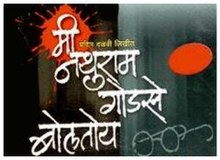Me Nathuram Godse Boltoy
| Me Nathuram Godse Boltoy | |
|---|---|
 Poster | |
| Written by | Pradip Dalvi |
| Directed by | Vinay Apte |
| Characters | Nathuram Godse |
| Original language | Marathi |
Me Nathuram Godse Boltoy is a two-act play written in the Marathi language. It has been written by Pradeep Dalvi (Mauli productions).[1][2] It is based on the book May It Please You Honour written by Gopal Godse. According to Karline McLain the play enacts Godse's defense plea and thus explores the assassination of Mahatma Gandhi and the trial of Godse from Godse's point of view.[3]
Staging and controversies[edit]
In 1989, Dalvi was denied permission by the Government of Maharashtra to stage the play.[4] The play was first staged in 1997. It ran 13 successful shows but was banned thereafter, by the governments of Maharashtra and Kerala.[5] The producer approached the high court in 1998, which permitted staging the play in 2001. The Supreme Court upheld the high court's ruling.[6] It was staged in Thane's auditorium Gadkari Rangayatan in April 2001 facing opposition from parties like Indian National Congress and Nationalist Congress Party; it was not presented again in Thane until 2011. An Indian Express news story quotes director Vinay Apte regarding the intimidation that artists connected with the play faced, such as the incident when the bus used by the artists while touring was set on fire by Indian National Congress activists in Mulund a suburb of Mumbai. Despite this 627 shows were staged in other cities. In February 2011, the play re-opened to a packed house at the same Gadkari Rangayatan, in Thane. Two platoons of state reserve police and 350 regular policemen under the direction of senior officers provided security.[1][2] According to Tushar Gandhi, Gandhi's great-grandson, the play creates martyrs of murderers who after "murdering him (Mohandas Karamchand Gandhi) are now trying to murder his memory".[7] It starred Sharad Ponkshe as Nathuram Godse.
Criticism[edit]
Both the play and its ban have been criticized by Shriram Lagoo a view which was considered representative of the views of other theater workers such as Vijay Tendulkar, Satyadev Dubey and Amol Palekar by The Times of India in its article Banning a play is not the solution. Civil liberties activists have opposed the ban though they consider the play "vicious".[8]
Nathuramayan[edit]
Yashawant Dinkar Phadke in his book Nathuramayan has criticised Dalvi's play as presenting "distorted and falsified facts".[9] Political activists opposing the play have urged Dalvi to answer questions put forward by Phadke in Nathuramayan.[2]
See also[edit]
References[edit]
- ^ a b "Day after clash, producers cancel Sunday show". Mumbai: The Indian Express Limited. 5 February 2011. Retrieved 9 April 2012.
- ^ a b c Kurian, Susamma (4 February 2011). "Political drama surrounds play on Nathuram Godse". New Delhi: HT Media. Archived from the original on 24 March 2013. Retrieved 9 April 2012.
- ^ Karline McLain (11 February 2009). India's Immortal Comic Books: Gods, Kings, and Other Heroes. Indiana University Press. p. 192. ISBN 978-0-253-22052-3. Retrieved 10 April 2012.
- ^ "The Rediff Special/Pradeep Dalvi An assassin speaks". Rediff On the Net. 1998. Retrieved 9 April 2012.
- ^ Ikram ul-Majeed Sehgal (1 May 2003). Defence journal. Ikram ul-Majeed Sehgal. Retrieved 10 April 2012.
- ^ Siddhaye, Ninad (26 December 2009). "Gandhi, Savarkar don green hats on stage". Mumbai: Diligent Media Corporation Ltd. Retrieved 9 April 2012.
- ^ AKHTAR, SHAMEEM (27 July 1998). "Villain As Hero". New Delhi: The Outlook Group. Retrieved 9 April 2012.
- ^ "'Banning a play is not the solution". The Times of India. Mumbai. 10 October 2001. Archived from the original on 13 September 2012. Retrieved 9 April 2012.
- ^ "Nathuram Godse". The Times of India. Mumbai. 2 August 2002. Archived from the original on 27 May 2013. Retrieved 9 April 2012.
